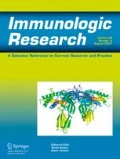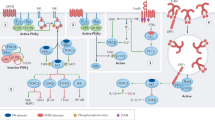Abstract
The phosphoinositide 3-kinase (PI3K)/Akt signaling axis plays an important role in cellular proliferation and growth signaling. With respect to the immune system, a growing body of data is helping to elucidate the role of this pathway in lymphocyte development, as well as to show how perturbations that lead to unregulated activation in this pathway may produce systemic autoimmunity or malignancy. Various knockout and transgenic murine models have been described for key mediators of this signaling pathway. Many of these models resulting in the activation of this pathway demonstrate features of systemic autoimmunity linking this pathway to autoimmune disease. Here, we review recently described murine models that exhibit activated PI3K/Akt signaling and the potential role this pathway in autoimmune disease, and also discuss the therapeutic implications of these findings.
Similar content being viewed by others
References
Cantley LC: The phosphoinositide 3-kinase pathway. Science 2002;296:1655–1657.
Koyasu S: The role of PI3K in immune cells. Nat Immunol 2003;4:313–319.
Okkenhaug K, Vanhaesebroeck B: PI3K in lymphocyte development, differentiation and activation. Nat Rev Immunol 2003;3:317–330.
Vanhaesebroeck B, Leevers SJ, Panayotou G, Waterfield MD: Phosphoinositide 3-kinases: a conserved family of signal transducers. Trends Biochem Sci 1997;22:267–272.
Koyasu S: The role of PI3K in immune cells. Nat Immunol 2003;4:313–319.
Datta SR, Brunet A, Greenberg ME: Cellular survival: a play in three Akts. Genes Dev 1999;13: 2905–2927.
Harris TE, Lawrence JC Jr: TOR signaling. Sci STKE 2003;2003: 15.
Sulis ML, Parsons R: PTEN: from pathology to biology. Trends Cell Biol 2003;13:478–483.
Borlado LR, Redondo C, Alvarez B, Jimenez C, Criado LM, Flores J, et al.: Increased phosphoin ositide 3-kinase activity induces a lymphoproliferative disorder and contributes to tumor generation in vivo. FASEB J 2000;14:895–903.
Rodriguez-Borlado L, Barber DF, Hernandez C, Rodriguez-Marcos MA, Sanchez A, Hirsch E, et al.: Phosphatidylinositol 3-kinase regulates the CD4/CD8 T cell differentiation ratio. J Immunol 2003;170:4475–4482.
Kishimoto H, Hamada K, Saunders M, Backman S, Sasaki T, Nakano T, et al.: Physiological functions of Pten in mouse tissues. Cell Struct Funct 2003;28:11–21.
Sharp LL, Hedrick SM: Commitment to the CD4 lineage mediated by extracellular signal-related kinase mitogen-activated protein kinase and Ick signaling. J Immunol 1999;163:6598–6605.
Shan X, Czar MJ, Bunnell SC, Liu P, Liu Y, Schwartzberg PL, et al.: Deficiency of PTEN in Jurkat T-cells causes constitutive localization of Itk to the oplasma membrane and hyperresponsiveness to CD3 stimulation. Mol Cell Biol 2000;20:6945–6957.
Suzuki H, Terauchi Y, Fujiwara M, Aizawa S, Yazaki Y, Kadowaki T, et al.: Xid-like immunodeficiency in mice with disruption of the p85alpha subunit of phospho-inositide 3-kinase. Science 1999;283:390–392.
Fruman DA, Snapper SB, Yballe CM, Davidson L, Yu JY, Alt FW, et al.: Impaired B cell development and proliferation in absence of phosphoinositide 3-kinase p85alpha. Science 1999;283:393–397.
Okkenhaug K, Bilancio A, Farjot G, Priddle H, Sancho S, Peskett E, et al.: Impaired B and T cell antigen receptor signaling in p110 delta PI 3-kinase mutant mice. Science 2002;297:1031–1034.
Bi L, Okabe I, Bernard DJ, Wynshaw-Boris A, Nussbaum RL: Proliferative defect and embryonic lethality in mice homozygous for a deletion in the p110alpha subunit of phosphoinositide 3-kinase. J Biol Chem 1999;274:10963–10968.
Bi L, Okabe I, Bernard DJ, Nussbaum RL: Early embryonic lethality in mice deficient in the p110beta catalytic subunit of PI 3-kinase. Mamm Genome 2002;13:169–172.
Clayton E, Bardi G, Bell SE, Chantry D, Downes CP, Gray A, et al.: A crucial role for the p110 delta subunit of phosphatidylinositol 3-kinase in B cell development and activation. J Exp Med 2002;196:753–763.
Li J, Yen C, Liaw D, Podsypanina K, Bose S, Wang SI, et al.: PTEN, a putative protein tyrosine phosphatase gene mutated in human brain, breast, and prostate cancer. Science. 1997;275:1943–1947.
Di Cristofano A, Pesce B, Cordon-Cardo C, Pandolfi PP: Pten is essential for embryonic development and tumour suppression. Nat Genet 1998;19:348–355.
Podsypanina K, Ellenson LH, Nemes A, Gu J, Tamura M, Yamada KM, et al.: Mutation of Pten/Mmac1 in mice causes neoplasia in multiple organ systems. Proc Natl Acad Sci USA 1999;96:1563–1568.
Stambolic V, Suzuki A, de la Pompa JL Brothers GM, Mirtsos C, Sasaki T, et al.: Negative regulation of PKB/Akt-dependent cell survival by the tumor suppressor PTEN. Cell 1998 Oct 2;95(1):29–39.
Di Cristofano A, Kotsi P, Peng YF, Cordon-Cardo C, Elkon KB, Pandolfi PP: Impaired Fas response and autoimmunity in Pten+/− mice. Science 1999;285:2122–2125.
Suzuki A, Yamaguchi MT, Ohteki T, Sasaki T, Kaisho T, Kimura Y, et al.: T cell-specific loss of Pten leads to defects in central and peripheral tolerance. Immunity 2001;14:523–534.
Suzuki A, Kaisho T, Ohishi M, Tsukio-Yamaguchi M, Tsubata T, Koni PA, et al.: Critical roles of P ten in B cell homeostasis and immunoglobulin class switch recombination. J Exp Med 2003;197:657–667.
Anzelon AN, Wu H, Rickert RC: Pten, in activation alters peripheral B lymphocyte fate and reconstitutes CD19 function. nat Immunol 2003;4:287–294.
Moody JL, Pereira CG, Magil A, Fritzler MJ, Jirik FR: Loss of a single allele of SHIP exacerbates the immunopathology of Pten heterozygous mice. Genes Immun 2003;4:60–66.
Franke TF, Hornik CP, Segev L, Shostak GA, Sugimoto C: PI3K/Akt and apoptosis: size matters. Oncogene 2003;22:8983–8998.
Condorelli G, Drusco A, Stassi G, Bellacosa A, Roncarati R, Iaccarino G, et al.: Akt induces enhanced myocardial contractility and cell size in vivo in transgenic mice. Proc Natl Acad Sci USA 2002;99:12333–12338.
Tuttle RL, Gill NS, Pugh W, Lee JP, Koeberlein B, Furth EE, et al. Regulation of pancreatic beta-cell growth and survival by the serine/threonine protein kinase Akt1/PKBalpha. Nat Med 2001;7:1133–1137.
Chen WS, Xu PZ, Gottlob K, Chen ML, Sokol K, Shiyanova T, et al.: Growth retardation and increased apoptosis in mice with homozygous disruption of the Akt1 gene. Genes Dev 2001 Sep 1;15(17): 2203–2208.
Rathmell JC, Elstrom RL, Cinalli RM, Thompson CB: Activated Akt promotes increased resting T cell size, CD28-independent T cell growth, and development of autoimmunity and lymphoma. Eur J Immunol 2003;33: 2223–2232.
Na SY, Patra A, Scheuring Y, Marx A, Tolaini M, Kioussis D, et al., Constitutively active protein kinase B enhances Lck and Erk activities and influences thymocyte selection and activation, J Immunol 2003;171:1285–1296.
Parsons MJ, Jones RG, Tsao MS, Odermatt B, Ohashi PS, Woodgett JR: Expression of active protein kinase B in T cells perturbs both T and B cell homeostasis and promotes inflammation. J Immunol 2001;167:42–48.
Malstrom S, Tili E, Kappes D, Ceci JD, Tsichlis PN: Turmor induction by an Lck-MyrAkt transgene is delayed by mechanisms controlling the size of the thymus. Proc Natl Acad Sci USA 2001;98:14967–14972.
Raizis AM, Ferguson MM, Robinson BA, Atkinson CH, George PM: Identification of a novel PTEN mutation (L139X) in a patient with Cowden disease and Sjogren's syndrome. Mol Pathol 1998;51:339–341.
Li N, Nakamura K, Jiang Y, Tsurui H, Matsuoka S, Abe M, et al.: Gain-of-function polymorphism in mouse and human Ltk: implications for the pathogenesis of systemic lupus erythematosus. Hum Mol Genet 2004;13:171–179.
Bernards, A, de la Monte SM: The ltk receptor tyrosine kinase is expressed in pre-B lymphocytes and cerebral neurons and uses a non-AUG translational initiator. EMBO J 1990;9:2279–2287.
Maru Y, Hirai H, Takaku F: Human ltk: gene structure and preferential expression in human leukemic cells. Oncogene Res 1990;5:199–204.
Fujita E, Kouroku Y, Miho Y Tsukahara T, Ishiura S, Momoi T: Wortmannin enhances activation of CPP32 (Caspase-3) induced by TNF or anti-Fas. Cell Death Differ 1998;5:289–297.
Gunther R, Kishore PN, Abbas HK, Mirocha CJ: Immunosuppressive effects of dietary wortmannin on rats and mice. Immunopharmacol Immunotoxicol 1989;11:559–570.
Gunther R, Abbas HK, Mirocha CJ: Acute pathological effects on rats on orally administered wortmannin-containing preparations and purified wortmannin from Fusarium oxysporum. Food Chem Toxicol 1989;27: 173–179.
Vlahos CJ, Matter WF, Hui KY, Brown RF: A specific inhibitor of phosphatidylinositol 3-kinase, 2-(4-morpholinyl)-8-phenyl-4H-1-benzorpyran-4-one (LY294002). J Biol Chem 1994;269:5241–5248.
Jacinto E, Hall MN: Tor signalling in bugs, brain and brawn. Nat Rev Mol Cell Biol 2003;4:117–126.
Shioi T, McMullen JR, Kang PM, Douglas PS, Obata T, Franke TF, et al.: Akt/protein kinase B promotes organ growth in transgenic mice. Mol Cell Biol 2002;22: 2799–2809.
Kwon CH, Zhu X, Zhang J, Baker SJ: mTor is required for hypetrophy of Pten-deficient neuronal soma in vivo. Proc Natl Acad Sci USA 2003;100:12923–12928.




